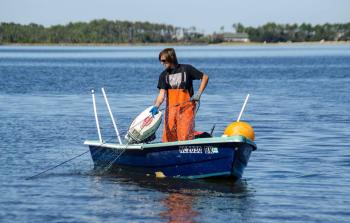Lyle Peele

Young Fishermen in the Northeast United States
Interviews with 39 fishers between the ages of 18-35, located along the US East Coast from Maine to North Carolina. Collectively, they represent a wide variety of gear types and fisheries. All had been fishing full-time for at least two years and wanted to make fishing their career. They describe motivations for choosing a fishing career, strategies used, barriers encountered, and facilitating factors that have enabled interviewees to defy the graying trend to become successful fishermen.
Please visit the Voices SoundCloud page to explore clips and stories that relate to this collection.
Sarah Schumann
Lyle Peele, 29 years old at the time of the interview, is a fifth generation waterman in Manteo, NC. Lyle and his family have seen the industry change, and his feelings about it are complex. He owns three boats and has diversified his fishing methods to adapt to changing conditions.
Scope and Content Note
In this interview, Lyle Peele discusses his fishing career and the challenges he faces in the industry. Peele talks about transitioning to flounder gigging in the summertime, as traditional fishing has become less profitable due to fluctuating fish prices and costly gear. He highlights the mounting pressure and stress of trying to make a living as a fisherman, especially with the high expenses of permits, gear, and fuel. Peele also touches on the conflict between commercial and recreational anglers, with some pushing for more restrictions on commercial fishing, which poses further challenges to his livelihood. Lyle mentions the struggles of young fishermen, the dwindling opportunities for new generations to enter the fishing profession, and the increasing barriers to obtaining commercial fishing licenses. Lyle explains that many young people his age are unable to afford houses and start families due to financial constraints in the fishing industry. He describes how the state of North Carolina's fishing regulations and license policies are discouraging new generations from joining the profession.
Peele calls for greater education and research to provide a more accurate picture of the fishing industry and challenges the effectiveness of current fish sampling methods. With increasing regulatory uncertainty, rising costs of living, and an increase in the expenses of purchasing fishing gear, Lyle says, "It’s love-hate, seriously. There’s some days I just want to burn everything I own and run away. And there’s other days I wake up and I get so excited to go fishing. It’s three o’clock in the morning and I am ping-ponging off the walls. I am ready to get up. In a nutshell, I love it. Good and bad, it’s all I’ve wanted to do."
To help the industry survive, Lyle sees a need for more public education: "Educate yourself. Do your own research. Don’t listen to everybody. Don’t listen to what the bigwigs are saying. Dig deep. Find out for yourself. Hop on a boat. Find out how it really is. Find the truth. Step into the shoes of a fisherman for a couple weeks. Find out how it is. … Know where your seafood comes from. Go talk to a fisherman. See what it’s like. Ask to ride along. Open your eyes."
Please Note: The oral histories in this collection are protected by copyright and have been created for educational, research and personal use as described by the Fair Use Doctrine in the U.S. Copyright law. Please reach out Voices@noaa.gov to let us know how these interviews are being used in your research, project, exhibit, etc. The Voices staff can help provide other useful resources related to your inquiry.
The NOAA mission is to understand and predict changes in climate, weather, oceans, and coasts, to share that knowledge and information with others, and to conserve and manage coastal and marine ecosystems and resources. The Voices Oral History Archives offers public access to a wide range of accounts, including historical materials that are products of their particular times, and may contain offensive language or negative stereotypes.
Voices Oral History Archives does not verify the accuracy of materials submitted to us. The opinions expressed in the interviews are those of the interviewee only. The interviews here have been made available to the public only after the interviewer has confirmed that they have obtained consent.
